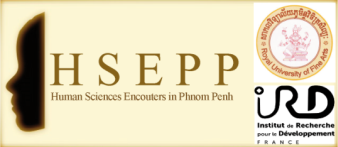Initiateurs et partenaires du projet
Initiateurs
UMI 233 trans VIH MI/ INSERM U 1175
Université Royale des Beaux Arts Phnom Penh
Partenaires
http://sites.sas.upenn.edu/tlc/
Agence Universitaire de la Francophonie - Bureau Asie Pacifique
HSEPP soutient le projet Manusastra !
Bulletin HSEPP février 2015
Bulletin Mensuel février 2015
Call for papers
Call for applications: "Scientific Objects and Digital Cosmopolitanism" Summer School
Venue: Manipal Centre for Philosophy and Humanities, Manipal, India
Dates: July 20-24, 2015
Deadlinefor applications: Monday March 23, 2015
Applications from post-graduate and doctoral students in the fields of philosophy, philosophy of science and social sciences, history and philosophy of science, science and technology studies, and cognate fields are invited to a five-day summer school in India, made possible by collaborations between institutions and scholars in Canada, India and Southeast Asia. This will be an excellent opportunity for graduate students interested in receiving advanced training in the philosophy of science and science and technology studies, with a focus on scientific objects and their relation to cosmopolitanism.
http://us3.campaign-archive1.com/?u=2d4375ec5dc6ff29d727d7830&id=36bc5d2cd1
Call for Papers: for a symposium entitled ‘The Emergence of Theravada Buddhism in Cambodia: Southeast Asian Perspectives on July 3 2015.
DEADLINE: 15 March 2015.
Mainland Southeast Asia underwent major civilizational transitions when the Hindu-Mahayana Buddhist Angkorian Empire met its end over the 13th-15th centuries and Theravada Buddhism emerged in its wake. While Angkor remained a reference for the new states that developed across the mainland, Theravada Buddhism structured the cultural, social and political forms which continue to define the region. Given the importance of these changes, astonishingly little is understood about how it actually happened, notably in the Angkorian heartland itself. By supporting interdisciplinary exchange on the Theravadin material heritage across the Southeast Asian region (including Sri Lanka) during this transitional period, the symposium aims to begin to redress this gap in our regional understandings.
http://www.soas.ac.uk/news/newsitem99848.html
Conference
Colloque International : Images du Cambodge : mythe, histoire et mémoire
10 -11 avril 2015 | Archives nationales
Auditorium | 59 rue Guynemer, 93380 Pierrefitte-sur-Seine | Métro Saint-Denis Université (ligne 13)
Au moment de la commémoration des quarante ans du génocide cambodgien, le 17 avril 2015, il est nécessaire de témoigner, par des manifestations culturelles et scientifiques, de la survivance et de la créativité d’un pays qui a connu l'élimination de masse et la destruction d'une communauté artistique. Entre 1975 et 1979, 90% des artistes et des intellectuels ont été persécutés et assassinés par le régime des Khmers rouges, laissant une société dévastée. La reconstruction politique, économique et culturelle du Cambodge est difficile ; dans ce contexte dramatique, les artistes ont joué un rôle essentiel, en particulier par un travail de transmission des arts traditionnels à la nouvelle génération. Mais les jeunes artistes cambodgiens sont en quête de renouvellement ; en questionnant le passé, ils cherchent aujourd'hui à comprendre la complexité de notre époque et à relever les défis de la mondialisation.
Cf. One document attached.
Appel à communications pour les Journées d’Études des Jeunes Chercheur en Études Asiatiques
Lieu à l’Université de Bordeaux les 26 et 27 mai prochains autour de la thématique suivante « Frontières et mobilités des hommes et des idées en Asie ».
Ces journées sont organisées avec le soutien du GIS Asie et de l’Université de Bordeaux.
Cf. One document attached.
Colloquium with Supeena Insee Adler and Christopher Adler
Topic: “The Cremation of King Norodom Sihanouk (Cambodia)”
Date: Wednesday, March 11, 2015 (12:00 PM - 1:30 PM)
Venue: 10383 Bunche Hall UCLA Campus Los Angeles, CA 90095 Free and open to the public
In February 2014, King Norodom Sihanouk of Cambodia was cremated in an elaborate and spectacular week-long ceremony in Phnom Penh. Cambodian scholars reconstructed royal cremation rituals from archival evidence and adapted these to a modern, urban, multi-media context for consumption by common Cambodians and international dignitaries. Supeena Insee Adler, Christopher Adler, and ethnomusicologist Deborah Wong visited Phnom Penh to witness and document the events at the ground level.
http://www.international.ucla.edu/cseas/events/11111
Publications
Réseau Asia & Pacifique: Lettre n 66- Févier 2015.
http://www.reseau-asie.com/phtml/la-lettre-du-reseau-asie/lettre_reseau_asie.html
Between war and peace: violence and accommodation in the Cambodian logging sector, by Simon Springer
https://www.academia.edu/459886/War_and_pieces?auto=download&campaign=upload_email
Towards safe abortion access: an exploratory study of medical abortion in Cambodia, by Pascale Hancart Petitet, Leakhena Ith, Melissa Cockroft, Thérèse Delvaux. p47–55.
http://www.rhm-elsevier.com/article/S0968-8080%2814%2943826-6/fulltext
Contested mobilities: gendered migration pressures among Cambodian youth
Media and the Geographies of Climate: Indigenous Peoples, Nature and the Geopolitics of Climate Change, by Matthew Tegelberg and Anna Roosval
The Fallout: Invisible Geographies Beyond the Liquid Eye, by Simon Springer
Moated Sites: a Political Economy Approach
Neoliberalism as discourse: between Foucauldian political economy and Marxian poststructuralism, by Simon Springer
The Ties that Bind: The Role of Hmong Social Networks in Developing Small-scale Rubber Cultivation in Laos, by Ian Baird
COLLECTIVE CAMBODIAN MEMORIES OF THE POL POT KHMER ROUGE REGIME, by Taum Yoseph Yapi
The Role of Community Mediation in Addressing Gender-based Violence [in Nepal]
by Laura McGrew








